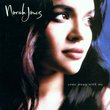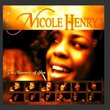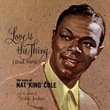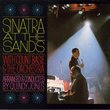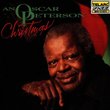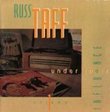| All Artists: Josephine Baker Title: Fabulous Josephine Baker Members Wishing: 1 Total Copies: 0 Label: RCA Release Date: 1/10/1995 Genres: Jazz, Pop, Broadway & Vocalists Styles: Traditional Jazz & Ragtime, Vocal Jazz, Easy Listening, Oldies, Vocal Pop, Cabaret, Traditional Vocal Pop Number of Discs: 1 SwapaCD Credits: 1 UPCs: 090266166824, 090266166848 |
Search - Josephine Baker :: Fabulous Josephine Baker
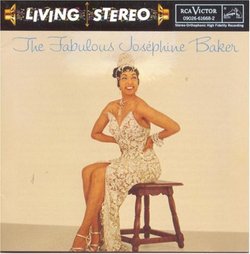 | Josephine Baker Fabulous Josephine Baker Genres: Jazz, Pop, Broadway & Vocalists
|
Larger Image |
CD DetailsSimilarly Requested CDs
|
CD ReviewsStill FABULOUS after 40 years !! T. H VonZabern | Boston, MA, USA | 10/22/2002 (5 out of 5 stars) "Giddy Can-Can type chansonettes, soulful ballads, Edit Piaf-esque hymns to Paris, Josephine Baker, at the peak of her vocal powers, delivers them all with consummate mastery and apparent ease. Her rich, creamy mezzo and rapid even vibrato are the perfect vehicle for these chansons, and her timing and dynamic expression are impeccable. Far from the twittery interpretations of her early recordings, these songs are the works of a mature master. Sure, some of the orchestrations and arrangements are corny, but that's the style of the period, and it's great fun. One or two times of listening to this, and you'll be humming happily along. To those who have never heard Josephine's later recordings, she may at moments be reminiscent of a more fluid, powerful and infinitely happier and more mellow Edith Piaf. The recoding engineers have done an admirable job of transferring this early stereo work to compact disc. While this recording does not offer the sonic depth of a contemporary recording, it nevertheless delivers everything with great clarity and negligible distortion." C'est magnifique... MrLopez2681 | USA | 05/12/2007 (5 out of 5 stars) "The manner in which the great Josephine Baker evolved as an artist is extraordinary, while as a vocalist, she aged like fine wine. Up until the late 1940s Baker's voice was light and twittering, and at times maybe even a little shrill. It was a fine example of the 'pop' female singing voice in vogue during the 1920s and 30s. By the early 1950s one finds that her voice had transformed into a marvelous mezzo instrument, and by the time she recorded the chansons available on this album, her voice had evolved even more: it was the instrument of a true master, grand and opulent as the city of Paris. Her technique was perfect and her pitch impeccably controlled and rich, with quick and precise vibrato. It is really is astounding to think that the same woman who sang "J'ai Deux Amours", "Haiti", or "C'est lui" is the vocalist on this album. Unfortunately when most people outside of Europe think of La Baker, it is not of the 'Diva magnifique' she became after WWII, but rather of the little black girl from St. Louis dancing topless in a banana skirt, singing in broken french, and living in a castle (or, even worse, of Lynn Whitfield in that awful 1990 bio-pic "The Josephine Baker Story", which, by the way, didn't even use Baker's real vocals). Most recordings of Baker that are easily available on disc are primarily low-budget releases of Baker's recordings from circa 1926-1940, and are essential interpretations of the classic recorded french chanson, inspite of the fact that Baker has an incredibly think accent and murders of the french language at every turn. But Baker didn't sing that way forever. As her singing abilities grew, her voice deepened, and she mastered the french language. This era appropriately coincided with the next transformation in her career that occured after WWII - from the Folies Bergere dancer to 'La Diva magnifique'. Her interpretations became, musically, primarily of South American influence in the mid-20th century modern style, and her voice was better than ever. This recording, a very appropriately titled re-release of the 1963 RCA compilation LP "The Fabulous Josephine Baker", is available for all to marvel at La Baker during this era. The album's liner notes give no information about the history of the songs included, the recording sessions, or anything else of real use, with the commentary included in the liner notes being taken from the original release of 1963. For some reason the back cover states that the album includes Baker singing "...the Jazz Age's favorite songs", a rather inaccurate statement, as these many of these numbers were either written especially for Baker long after the so-called "Jazz Age" came to an end, or are her own interpretations of popular french chansonettes (it is significant to state that Baker was NEVER a jazz singer or musician; but rather the poster girl for the Harlem renaissance and the Jazz age. Her "occupation", if you will, is almost always incorrectly credited - although she was a much celebrated dancer in her early career, she spent the majority of her career as a singer). Six of the songs offered here are taken from Baker's 1959 show "Paris mes amours", which she took to the USA in the 1963 as "The Fabulous Josephine Baker", while a few others are taken from her 1961 album of medlies "Chante Paris". Unfortunately there a few numbers from this period that are missing from this disc: "Terre seche", which was recently covered by the french pop singer LamieLa; the divine "Clopin-Clopant" (which has nothing to do with the popular version recorded by Streisand); and Baker's interpretations of Maurice Chevalier's "Fleur de Paris" and Charles Trenet's "Romance de Paris". "Clopin-Clopant", "Romance de Paris", "Fleur de Paris" and the instrumental numbers were not released on disc until 1993, when RCA put out the CD "My Greatest Songs: Josephine Baker" in the out-of-print "My Greatest Songs" CD series. The wonderful "Terre seche" has yet to be released on disc. Seven songs from "Paris mes amours" were originally sold in 2 volumes on 45 inch LP at the Olympia Theatre when the show opened in 1959, and were never sold again. In 1962 RCA released the LP "The Fabulous Josephine Baker" in order to commemorate Baker's American tour of the same name, and in 1963 they released a new version of the album as part of their 'Living-Stereo' series, this time including more chansons Baker recorded during the 1959-1960 recording sessions. Throughout the 1960s RCA released an incredible number of compilation albums that featured different combinations of songs taken from Baker's 1959-1960 recording sessions (8 by my last count). In 1995 the original Living-Stereo LP was issued onto the CD release reviewed here. The original LP release of "The Fabulous Josephine Baker" included a large yellow label that rightly announced that the album included " ... superb orchestral backing ... ". Indeed, on these recordings Baker is accompanied by some wonderfully orchestrated music (another reviewer on this page calls the arrangements corny, which is shamefully inaccurate). The orchestrations are primarily the work of Jo Boyer (uncredited in the liner notes), the french trumpet player and big band leader. In the more up-tempo numbers Baker's husband Jo Bouillon does the honors with regards to arrangements, and his early classical training certainly shows. In the ballads the manner of orchestration is reminiscent of Ray Ellis, and is lovely in every respect - one finds uses for distant operatic vocalizations, large choirs, lush strings, and colorful percussion. In the up-tempo numbers the scoring is in the typical mid 20th century South American style often heard in the halls of the 'Grand cabaret', where one heared an entertaining mixed-bag of many influences - big band, exotica, samba, classical, tropicalismo, and spanish. The conducting is more than appropriate for such music, recorded under the skilled direction of Bouillon, as well as Jean Claudric (for tracks 10 and 13). The album starts off with "Paris Mes Amours", the opening chanson from the show of the same name, which has Baker's voice at its most grandiose and powerful, with giddy accompniment very much in the style of the old music-hall. "Le Marchand de Bonheur" is a typical latin-influenced selection from the revues La Baker put on in the 1950s and 60s, complete with scantily clad back-up singers and dancers singing "La La La..." at the top of their lungs. "Moi 'io'" is a beautiful, easy number in a bal-musette style, and includes an instrumental break that can make anyone long for the city of Paris. "J'Attendrai" is wonderful - a march with back-up from bass clarinet and triangle (Baker often taught her audience how to do the 'twist' to the opening bars of this chanson). In "J'Attendrai" she sings in a rather deep contralto style that can amaze anyone who has ever heard her early recordings. Next is the wonderful "Avec", with its samba rhythm and maraca accompaniment, along with some rather complex arrangement for brass. Baker usually included this song as the first number after the overture in the shows of her later years and usually in a slow-tempo arrangement straight out of the Cuban Tropicana (the album "En La Habana" includes a far superior version of this song). "Donnez-Moi la Main" is a spanish-virtuoso number sung in french, in which La Baker takes on the role of a Gypsy telling someones fortune. Baker included this number in many of her shows wearing a wonderful gypsy costume. "Je Voudrais" is a delicate chanson with more intimate vocals from Baker, and "La Seine", set to a waltz with touches from accordian and a distant operetic vocalist, has Baker singing of the famous River in both french and english. "Sonny Boy" is taken from the old musical "The Singing Fool", and is 1 of only 2 tracks sung entirely in english. Baker's cover of Edith Piaf's chanson "Sous Les Toits de Paris" is another easy number with gorgeous vocals and arrangement, and "La Ballade des Rues de Paris" is yet another ode to Paris. "Mon P'tit Bonhomme" is a sparkling waltz in the Viennese style, with colorful accompaniment from glockenspeil, celeste and sweeping strings. "En Avril A Paris", which Baker also sung as "April in Paris", is a sweet sentimental hymn to the city of lights, sung in both french and english. "Sag Beim Abschied Leise Servus", sung in german, is another lovely ballad with a superb backing from a large choir. "Don't Touch My Tomatoes" is a charming number that is something of a cross between a 1950s pop hit and a song worthy of Carmen Miranda. "The Fabulous Josephine Baker'" is one of only two albums one can easily obtain on disc of La Baker in her later, best years. The other is "En La Habana", recorded in Havana, Cuba in 1966 when Baker was invited by Fidel Castro to perform at the Teatro Musical de la Habana. This recording includes Baker's "Dans Mon Village", as well as great renditions of "Quando Quando" and "Esto es Felicidad". Also included on "En La Habana" is a knock-out performance of "Avec", with Baker singing at her absolute best with the seductive Cuban orchestra. Another album with some essential recordings of Baker from circa 1950-1970 is "C'est vous", which includes many of the latin-styled selections Baker favoured in the 1950s. There are two essential live albums that have recently been re-released onto CD in Europe - "Josephine Baker in Tivoli", which was recorded during Baker's 1963 show at the Tivoli Gardens in Copenhagen, Denmark. This recording was only available on an out-of-print LP for many years (a decent copy of the original LP can go for $100). Baker's last show, the spectacular "Josephine a Bobino 1975" has been re-released on disc 3 times, and is currently not in print, though one can obtain the original 2 LP release through online markets. Hopefully the 1973 recording "Josephine Baker Recorded Live at Carnegie Hall" gets a re-release as well (it was released onto CD in France in 1995, but it is not in print). Although this recording was unfortunately made while Baker was terribly hoarse, her wonderful audience interaction and the fact that they lovingly applaude her every move more than make up for it. There are also two recordings Baker made in the 1960s which have yet to turn up on disc - "Chante l'amour" is divine in every respect, while "Chante Paris" includes some wonderful french chansons that will remind anyone of Paris. The cover photograph of "The Fabulous Josephine Baker" by Levene is a great visual representation of who Baker was in the latter part of her career - wearing a magnificent glittering form-fitting gown, all topped off with an eleborate head-dress straight out of the Folies Bergere that even puts Bob Mackie to shame, looking radiantly beautiful, with her big, trade-mark smile. If only this album could give one the astounding visual of the great Josephine Baker live on stage descending down a staircase with her grandiose costumes, surrounded by her sexy back up dancers and singers, hitting her amazing high notes with her rich, smooth, mobile voice and chanting to the world of the glories of Paris. She was truely a Diva of Divas, and one of the greatest modern pop stage performers the world has seen. " Simply Fabulous! Josef Bush | Phoenix, AZ | 02/14/2007 (5 out of 5 stars) "THis CD, The Fabulous Josephine Baker, is an excellent example of what she had that made her perhaps the top female performer and singer in France for more than thirty years.
If we think of her as an Ameican singer who happened to live and work in France, we won't get it. What Josephine was, was an expatriate singer from the United States who became in a short time one of th best, certainly, and even possibly the very best, French - Parisian POP singer of all time. She was a French singer, therefore, and because American Xenophobia doesn't allow for any other people at any time or from any country to possibly compete with and surpass American performers -- basebqll teams that win the world series are "world champions" though they never play internationally; heavyweight boxers, when they win the title, become "World champions" though mostly they only fight other american boxers -- Josephine Baker is not, and could not be considered more than a novelty in the USA. Her vocal production was usually called "reedy" and affected. But, to the French, her voice was, in its way, as French as Piaf's or de Lisle's or Mistinguettes, or any of the other singers of the time, because to sing in French, well, you must produce a sound that is compatible with the consolants and vowels of the language. That's why virtually all French singers (of both sexes and all disciplines) sound the way they do. They sing for a descriminating French audience. Piaf the Tragedienne, is most familiar to Ameicans mostly because of her distinctive nasal burr. Americans don't like Tragic songs, except in the Country/Western context, but accept it in Piaf because Piaf is almost all they know of French POP music. Jo Baker they seldom heard, and only with Jim Crow shame. But Baker personifies an aspect of French culture that is unique in the world; she is the spirit of Paris; the fun, the excitement, the joie de vivre that one feels just being there. She stands on the Eifel Tower the way an angel stands on the tip of the Christmaqs tree, waving her arms and legs, smiling that huge smile of hers and hitting those amazing high notes, welcoming everybody around the world, to the City of Light, to Paris. I strongly recommend her En Avril a Paris: check out her English-language choruses and riffs. In Moi, she appears as Shirley Bassey's mom; so hot! So brassy! So big Nightclub! Paris mes amours is wonderfully giddy and gay; something right out of a Follies production, with a chorus of half-dressed boys and girls singing their hearts out; all buttocks, thighs and navels. My particular favorite is, I think, Avec; a Brazilian Samba, with chorus. It's fun to listen to. So's the whole album. The woman had such range. Her voice is by far, the most athletic, flexible and pitch perfect and secure of any of her generation, and certainly of ours. The babe had pipes. " |

 Track Listings (15) - Disc #1
Track Listings (15) - Disc #1
